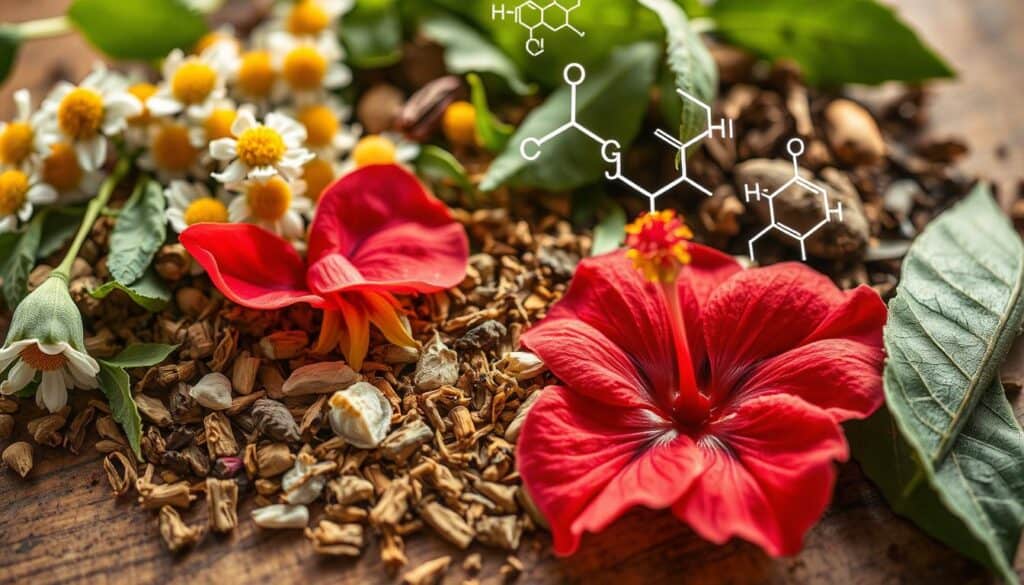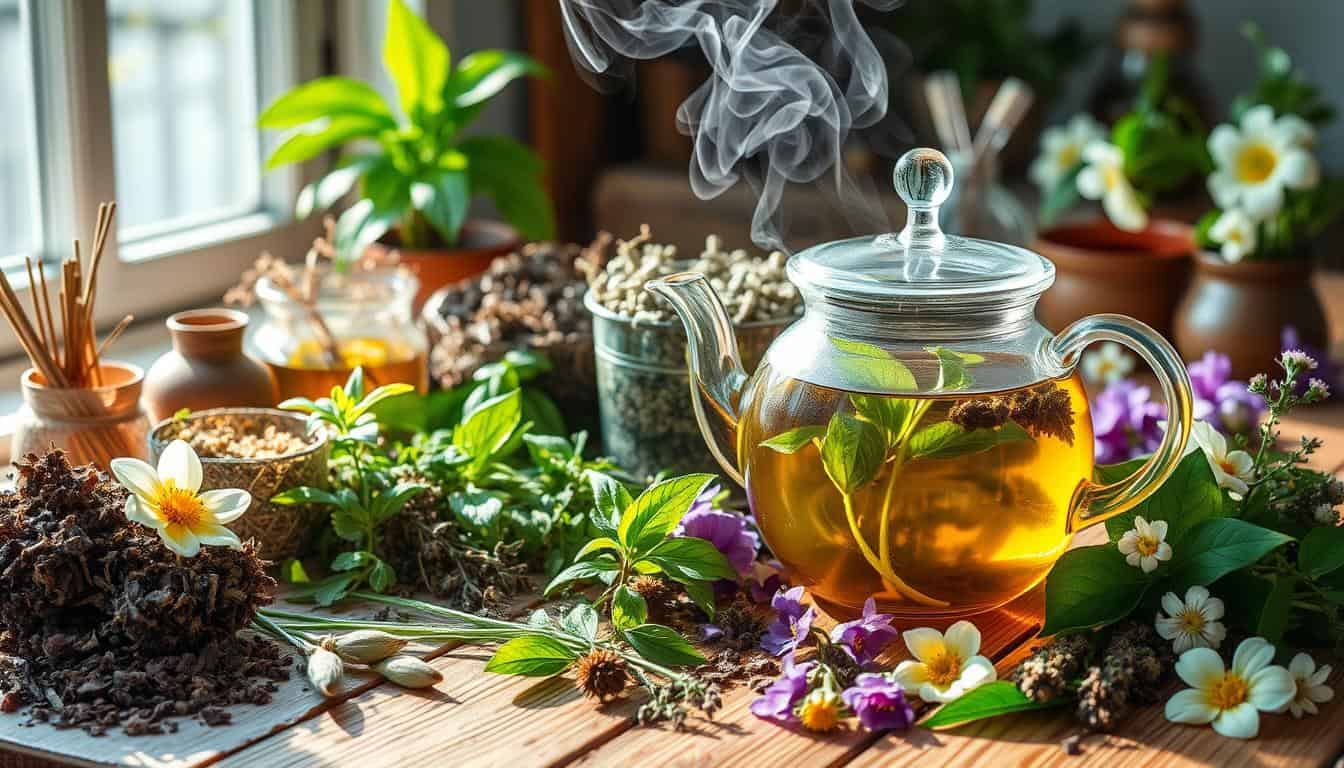The Science Behind Healing Herbal Teas
This post may contain affiliate links which means I may receive a commission for purchases made through links at no extra cost to you. I only recommend products I truly believe in. Thank you for your support!
Herbal remedies have caught the attention of health lovers everywhere. They offer a natural way to feel better using plants. These teas are more than just a drink; they’re filled with healing compounds that boost our health.
Today, science is uncovering the amazing benefits of herbal teas. From chamomile’s immune boost to ginger’s fight against cancer, these old remedies are getting a scientific thumbs-up. The World Health Organization sees their value, making them key in health plans worldwide.
Herbal teas are full of good stuff called polyphenols. They can help lower disease risks and keep cells healthy. These teas work by interacting with our bodies in special ways.
Studies show herbal teas can do a lot. Chamomile might help older people live longer, and hibiscus tea could control blood pressure. Ginger tea is great for fighting nausea in cancer patients, cutting symptoms by 40%.
As we learn more, herbal teas are becoming more than just old remedies. They help with metabolism, reduce inflammation, and protect against damage. They’re a great part of a healthy lifestyle.
Introduction to Herbal Teas and Their Popularity

Herbal teas take us on a journey through the world of botanical medicine. They connect today’s wellness with ancient herbal wisdom. Starting around 2700 B.C. in ancient China, these teas have grown from simple customs to a global health trend.
The history of herbal teas is long and rich. Long before science, ancient cultures saw their healing power. They developed deep knowledge of plant remedies.
Brief History of Herbal Tea Use
Herbal medicine has been key in many cultures for ages. Important moments include:
- Third century C.E.: Tea trade started in China
- 1610: Dutch East India Company brought Chinese tea to Europe
- Late 19th century: Tea farming spread to non-Asian areas
- 1904: Iced tea was invented
- 1953: The first instant tea was made
Types of Herbal Teas and Their Uses
Today, we have many herbal teas with different health benefits:
- Chamomile: Helps with sleep and might fight bacteria
- Peppermint: Good for digestion and has antioxidants
- Ginger: Helps with nausea
- Hibiscus: May lower cholesterol and blood pressure
- Echinacea: Supports the immune system
Herbal teas today mix old wisdom with new wellness. They offer natural health solutions for those looking for a holistic approach.
The Chemistry of Healing Compounds in Herbal Teas
Herbal teas are a blend of botanical medicine and natural healing. They are filled with powerful phytochemicals that bring great health benefits. This makes them more than just drinks; they are powerful tools for wellness.

The science behind herbal supplements is complex. These natural remedies have intricate networks of bioactive compounds. These compounds interact with our bodies in complex ways.
Active Ingredients in Popular Herbal Teas
Different herbal teas have unique healing compounds:
- Saponins: Support cardiovascular health
- Flavonoids: Provide powerful antioxidant protection
- Alkaloids: Offer potential neurological benefits
- Terpenoids: Support immune system function
How These Compounds Interact with the Body
Phytochemicals interact with our cells in complex ways. They support cellular health and can trigger important processes. For example, they can help keep cells clean and functioning well.
| Herbal Tea | Key Compounds | Primary Health Benefits |
|---|---|---|
| Mint Tea | Menthol | Antibacterial, Analgesic |
| Ginger Tea | Gingerols | Anti-inflammatory, Digestive Support |
| Green Tea | Catechins | Antioxidant, Metabolic Health |
Learning about the chemistry of herbal teas shows their potential as natural treatments. These botanical medicines offer a holistic way to improve health. They use nature’s complex molecular designs to help us.
Health Benefits Supported by Research
Herbal therapy is getting more attention for its healing powers. Scientists are studying how therapeutic herbs work with our health.

Studies show herbal teas have many health benefits. This is thanks to new scientific findings.
Antioxidant Properties of Herbal Teas
Herbal teas have strong antioxidants. These fight off cell damage. Research shows they can:
- Neutralize harmful free radicals
- Reduce oxidative stress
- Support cellular protection
Effects on Digestion and Metabolism
Herbal teas help with digestion and metabolism. Each herb has its own benefits:
| Herbal Tea | Digestive Benefits | Metabolic Impact |
|---|---|---|
| Ginger Tea | Reduces nausea | Supports metabolism |
| Peppermint Tea | Alleviates bloating | Improves digestion |
| Chamomile Tea | Calms digestive system | Reduces inflammation |
Herbal Teas for Stress Relief and Mental Clarity
Some herbal teas are great for mental health. Lavender and lemon balm have been studied. They might help lower anxiety and boost brain function.
Research on herbal therapy keeps finding new ways to help us stay well. It offers natural options instead of traditional medicine.
The Role of Herbal Teas in Holistic Wellness
Herbal teas are more than just drinks. They offer a holistic way to wellness, blending old wisdom with new health practices. They are a gentle yet powerful way to support your overall health.
Adding herbal teas to your daily routine can change how you view natural healing. These drinks offer many benefits for both body and mind:
- Boost immune system function
- Reduce stress and anxiety
- Improve digestive health
- Enhance mental clarity
Creating Mindful Tea Rituals
Herbal therapy is not just about drinking tea. It’s about the mindful act of enjoying it. Preparing and sipping a warm herbal tea slowly can help reduce stress.
Selecting the Right Herbal Teas
When picking herbal teas, keep these tips in mind:
- Choose organic, high-quality loose-leaf teas
- Match tea varieties to specific wellness goals
- Try different herbal blends
- Get advice from healthcare professionals
Studies show that over 15 herbal teas have unique health benefits. They can boost immunity and help you relax. By using herbal therapy with purpose and knowledge, you can unlock their deep healing power.
Considerations and Limitations of Herbal Tea Use
Herbal supplements can be beneficial for health, but knowing the risks is key. It’s important to be careful, mainly for those with health issues or on medication. Traditional herbal medicine needs a close look, too.
Most herbal teas are seen as safe, but some might cause side effects. If you’re on prescription drugs, talk to your doctor first. Herbal teas could affect how well your medicines work or cause health problems.
Possible Side Effects and Interactions
Some herbal teas might cause allergies or stomach issues in certain people. They could also mess with anesthesia or surgery, so tell your doctor about them. Pregnant women, nursing moms, older adults, and kids should be extra careful.
Choosing Quality Herbal Teas for Optimal Benefits
Choosing the right herbal teas is important to avoid risks. Look for organic, third-party tested ones. Since not all herbal medicines are regulated, do your homework and get advice from experts. This way, you can safely add herbal supplements to your routine.






